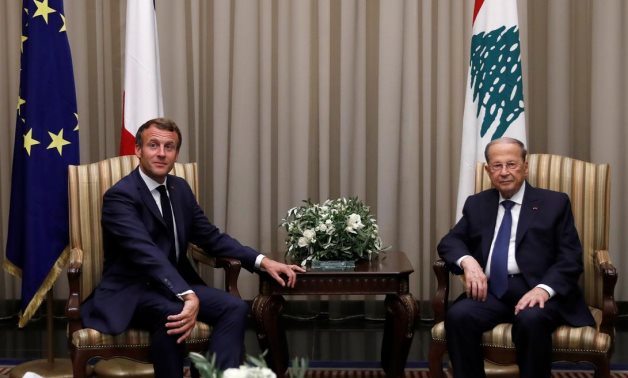
Lebanese President Michel Aoun welcomes French President Emmanuel Macron at Beirut International airport, Lebanon August 31, 2020. REUTERS/Gonzalo Fuentes/Pool
BEIRUT (Reuters) - France’s President Emmanuel Macron said he would press for reforms aimed at dragging Lebanon out of a financial abyss as he began a visit to Beirut hours after Lebanese leaders named diplomat Mustapha Adib new PM on Monday under French pressure.
With its economy in deep crisis, a swathe of Beirut in tatters following a huge explosion on Aug. 4, and sectarian tensions rising, Lebanon is facing the biggest threat to its stability since the 1975-90 civil war.
Macron was met at the airport by President Michel Aoun as the French leader made his second visit in less than a month. “So President, it’s been a busy day, hasn’t it,” Macron told Aoun.
Macron told reporters said he wanted to “ensure that the government that is formed will implement the necessary reforms.”
Foreign donors say Lebanon must tackle corruption and waste before they release financial support.
Senior Lebanese officials said Macron’s mediation was essential in securing agreement on a new prime minister in the 48 hours before consensus emerged on Adib, the former ambassador to Germany. Politicians had been deadlocked last week.
“The opportunity for our country is small and the mission I have accepted is based on all the political forces acknowledging that,” said Adib, who won the support of nearly all Lebanon’s main parties in consultations hosted by Aoun.
“There is no time for talk and promises ... It’s the time to work with everyone’s cooperation,” he said.
He called for the formation of a government of competent specialists in record time, an immediate start to reforms and a deal with the International Monetary Fund. Lebanon’s talks with the IMF have been stalled since July.
“We welcome the nomination of a new prime minister and hope that a new government will be formed shortly with a mandate to implement the policies and reforms that Lebanon needs to address the current crisis and restore sustainable growth,” an IMF spokesperson told Reuters.
“Our children died. We don’t recognise you,” a passer-by shouted at him. Another offered to shake hands with Adib, who wore a mask against COVID-19.
The explosion, in which volatile chemicals stored unsafely for years detonated, led to the resignation of the previous government, now acting as caretaker.
Since October, the financial crisis has sunk Lebanon’s currency, locked savers out of deposits held by a paralysed banking system and fuelled poverty. The root cause is decades of corruption and waste overseen by a political elite.
Macron’s visit coincides with Lebanon’s centenary, at a time of profound doubts that it has a future as a viable state under the sway of former warlords and sectarian leaders loyal to different regional masters, Iran and Saudi Arabia.
Macron made a series of phone calls to Lebanese leaders at the weekend that were vital to securing consensus on Adib.
“It was the pressure of his calls to everyone, the pressure of his coming to Lebanon, the pressure of everyone not wanting to upset him,” a senior Lebanese politician said.
Macron said on Friday that the exceptional moment facing Lebanon led him to increase pressure. “France has convinced its European and American partners and a good part of the regional partners that we are honest brokers,” he said.
Adib’s name surfaced on Sunday when he was nominated by former PMs, including Saad al-Hariri who heads the biggest Sunni Muslim party. Under the Lebanese system, the post of premier must go to a Sunni.
Hariri’s Future Movement and the powerful Iranian-backed Shi’ite party Hezbollah were among those nominating him.
With Hariri’s backing, Adib will enjoy more support than Hassan Diab’s outgoing government, nominated by Hezbollah and its allies which together have a parliamentary majority.
Comments
Leave a Comment